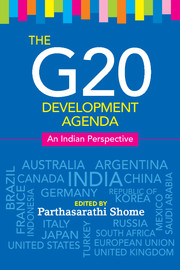Book contents
- Frontmatter
- Contents
- List of Tables and Figures
- Preface
- Section 1 Introduction
- Section 2 The Development Agenda
- Section 3 Energy Security and Environmental Sustainability
- 6 The Co-benefit Principle and the Durban Platform: Towards an Inclusive Framework for Negotiating Climate Finance
- 7 Greening the G20 Agenda: A Way Forward
- 8 Revisiting Fossil–Fuel Subsidies in the Context of Ongoing G20 Dialogue
- 9 Should India Join the International Energy Agency?
- Contributors
- Index
8 - Revisiting Fossil–Fuel Subsidies in the Context of Ongoing G20 Dialogue
from Section 3 - Energy Security and Environmental Sustainability
Published online by Cambridge University Press: 05 May 2015
- Frontmatter
- Contents
- List of Tables and Figures
- Preface
- Section 1 Introduction
- Section 2 The Development Agenda
- Section 3 Energy Security and Environmental Sustainability
- 6 The Co-benefit Principle and the Durban Platform: Towards an Inclusive Framework for Negotiating Climate Finance
- 7 Greening the G20 Agenda: A Way Forward
- 8 Revisiting Fossil–Fuel Subsidies in the Context of Ongoing G20 Dialogue
- 9 Should India Join the International Energy Agency?
- Contributors
- Index
Summary
Introduction
Background and context
The reliance on energy subsidies by governments worldwide is ascribed to the need to achieve diverse goals of economic development, social equity and environmental protection. In developed and emerging economies alike, there is widespread use of subsidies in both production and consumption of energy, even though the justification provided differs between the two groups of countries. For instance, developed country governments justify energy subsidies in production on grounds of maintenance of local or regional employment (especially during economic recession) or boosting domestic supply of energy. On the other hand, developing and emerging economies mostly attribute subsidies to alleviating energy poverty and ensuring access, especially to populace at subsistence levels of energy consumption. Despite significant reforms toward market-orientation and rationalized regulation in developing and emerging economies, the reliance on energy subsidies remains high.
Notwithstanding their well-intentioned rationale, it is recognized that subsidies tend to distort price signals, and hence induce inefficient choices by producers and consumers. By making a fuel cheaper, subsidies induce overuse or inefficient use of energy, culminating in negative externalities such as excessive natural resource depletion or environmental pollution, including emissions of greenhouse gases. Further, subsidies impose a burden on budgetary resources, and may even crowd out other forms of government investment that may be merited (Saunders and Schneider, 2000).
Arguably, however, provisioning of subsidies is fundamentally country-specific and draws from the sovereign right of each country to develop economic and social policies based on its national circumstances and policy objectives. However, on account of their extension into domains of international trade and the global environment, fuel subsidies occupy an important place in the discussion agenda at international and regional forums such as the WTO, UNFCCC, the G20 leaders' conferences, and Asia Pacific Economic Cooperation (APEC).
At their meeting held during 24–25 September, 2009 in Pittsburgh, USA, the leaders of the G20 nations agreed to ramp up efforts to rationalize and reduce fossil fuel subsidies in a manner that wasteful energy consumption is avoided while, at the same time, the negative consequences for the poorest (as essential services provision) are prevented.
- Type
- Chapter
- Information
- The G20 Development AgendaAn Indian Perspective, pp. 203 - 255Publisher: Cambridge University PressPrint publication year: 2015
- 1
- Cited by



